Advertisement
Housing Authorities Play Integral Role In Keeping People Stable, Fed During Pandemic
Resume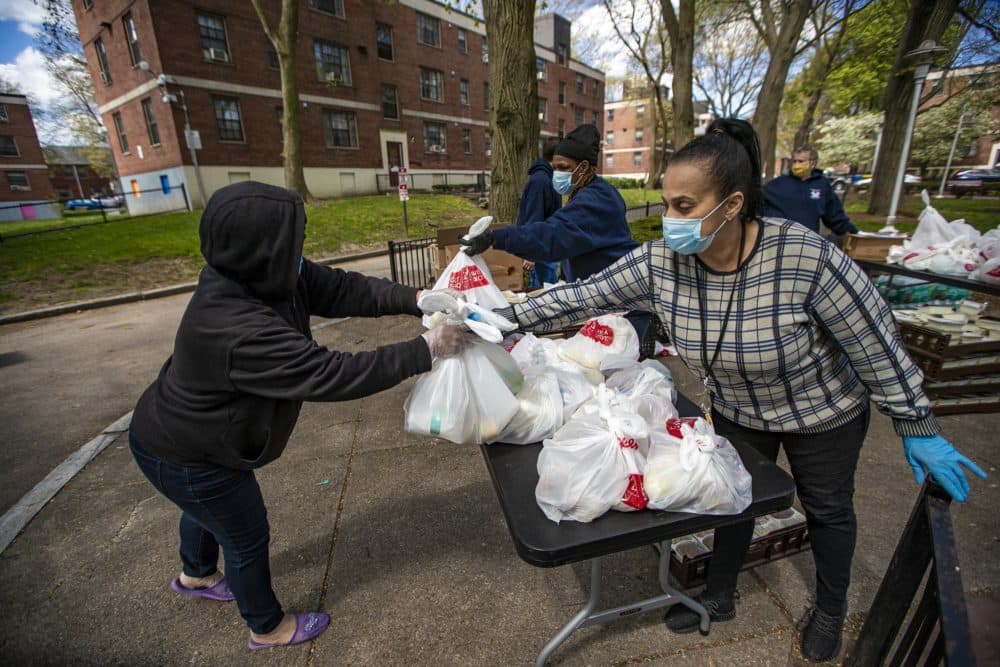
Right now Ashley Carrasquillo is more than mother to her 6-year-old daughter. She's a home school teacher. And she's a reassuring presence, as the single mom and daughter settle into a new apartment in the midst of the coronavirus pandemic.
Carrasquillo says she and her daughter spent several years bouncing between homeless shelters and family members' homes. They had one short-lived apartment but got evicted because Carrasquillo could no longer afford the rent. A Section 8 voucher issued by Boston Housing Authority helped her get her new apartment in a multi-family home in nearby Everett.
"I love it. I have my space, my daughter has her space," Carrasquillo says. "I've gotten her to change her schedule from what we had in the shelter. So now she's going to bed on time, waking up on time, doing her homework. So I'm kind of happy — very happy, actually."
When the pandemic was first taking hold, Carrasquillo and her daughter were living in a shelter in Dorchester. They shared a two-bedroom unit with another family until the end of March.
"I mean, it was difficult, but I pushed through it," Carrasquillo recalls. "It was just mainly keeping my daughter away from everyone, staying in the room."
They're among 231 families and individuals who were homeless who've gotten housing with the help of rental assistance vouchers from Boston Housing Authority since March 1.
"There is incredible urgency to continue to house families coming out of shelter," says BHA Administrator Kate Bennett.
"Part of the solution to this emergency is to continue to house those families," she says.
"We've got about 500 families with vouchers seeking housing on the street right now. ... Folks, especially in the affordable housing community -- the privately owned affordable housing community -- are really stepping up on that."
BHA Administrator Kate Bennett
Bennett adds that it's always a challenge to find landlords who will take vouchers. But it's been even tougher during the COVID crisis. Fewer apartments have become available, and it's been harder for people to view and lease them.
"We've got about 500 families with vouchers seeking housing on the street right now. And we've really put a push on to try to get landlords to house those families," Bennett explains. "Folks, especially in the affordable housing community — the privately owned affordable housing community — are really stepping up on that."
Since the beginning of March, BHA has also housed 56 families or individuals in its own housing developments — all of them coming out of homelessness.
Bennett says BHA is keeping up its pace housing people even while dealing with the challenges the pandemic presents for a public housing authority of 23,000 residents in about 10,500 apartments.
'Just In The Right Moment'
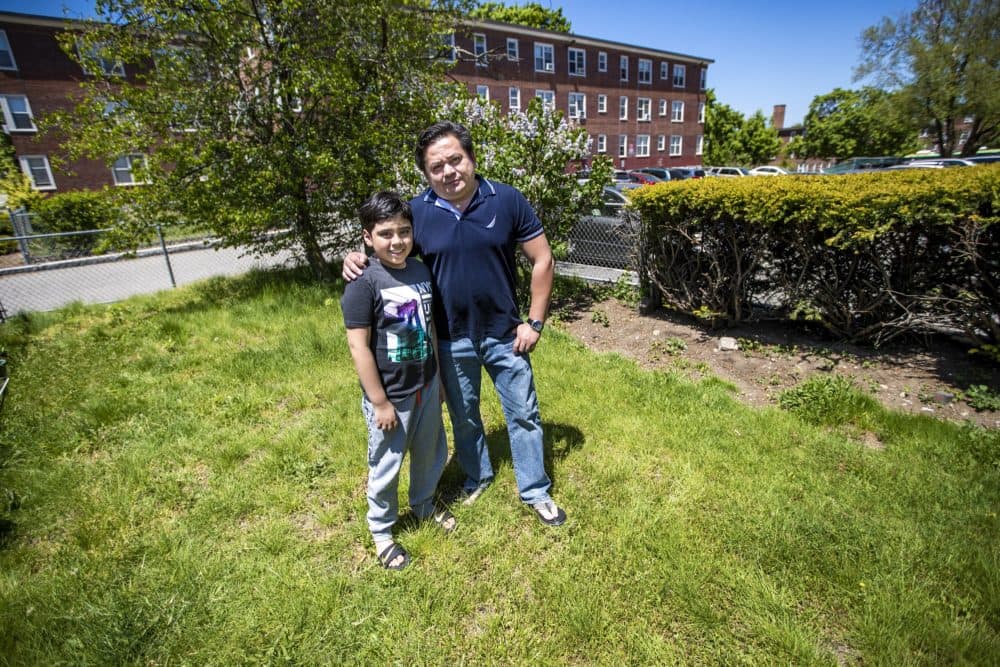
Forty-one-year-old Dimas Molina and his 9-year-old son are one of the new BHA families. They moved into an apartment in the Faneuil Gardens complex in Brighton in March.
"It came out just in the right moment, right time," Molina says. "I feel really safe over here. This is a nice place."
A Salvadoran immigrant and single father, Molina lived with his son in homeless shelters for the past four years. And he was out of work for the last two-and-a-half months. He's employed by a company that cleans office buildings — and those buildings were shut down.
"I can tell you, I spent all of my savings right now, and I'm just getting back to normal," Molina says.
Now that he's back to work, if he struggles, he'll have protections from the state to help him hold onto his apartment.
A statewide eviction moratorium went into effect last month.
The state has also stopped housing authorities from increasing rent.
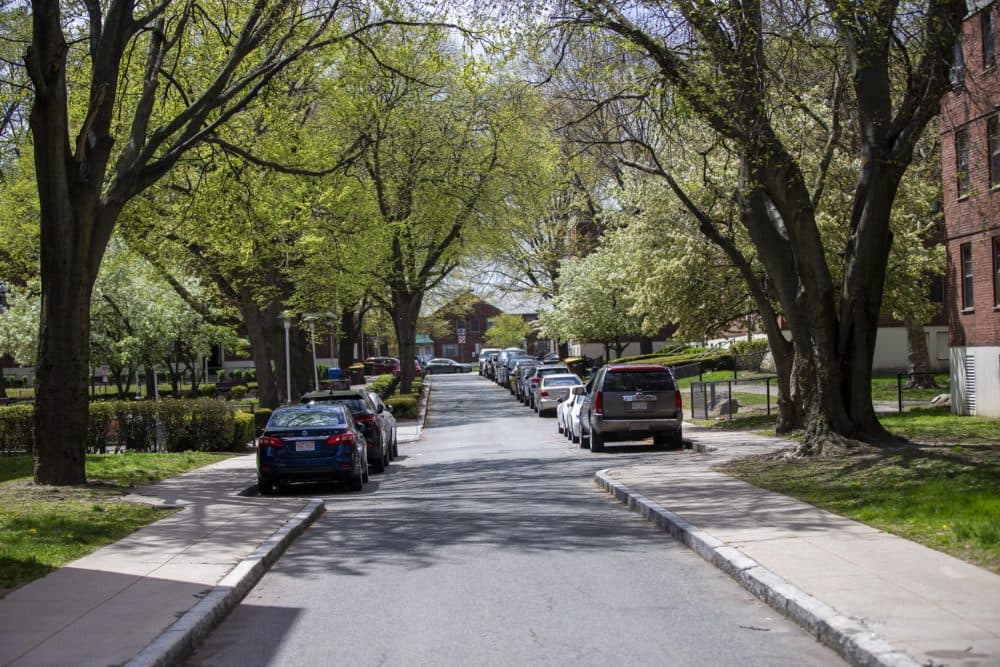
Housing authority tenants pay 30% of their income for rent, meaning rent normally increases or decreases as one's income goes up or down.
The executive director of the Attleboro Housing Authority, Paul Dumouchel, says rent policies are helping people who are doing better financially because of the pandemic — and those who have taken a financial hit.
"We've given them the opportunity to re-certify their income to lower their rent, number one," Dumouchel explains. "But number two, for those health care workers and food retail workers ... who may have seen an increase in their hours and their income, we don't want to penalize them for working more hours [by increasing their rents]."
In Worcester, housing authority executive director Alex Corrales says more than 450 households — a combination of voucher holders and public housing residents — have had their rents reduced due to lost income during the pandemic.
The housing authority has housed slightly fewer families and individuals during the pandemic compared to same period last year, according to Corrales. But, he says, a slightly higher percentage have been people who were homeless. Forty-three percent of the 63 families and individuals housed between March 10 and May 19 of this year were homeless. Last year during the same timeframe, 39% of the 77 individuals and families that moved into public housing in Worcester were coming out of homelessness.
And this year, more people are struggling to put food on the table, Corrales says. To that end, he repurposed his drivers who normally shuttle seniors around the city.
"We said, OK, instead of you driving elders to the senior center, we're going to start delivering food to our elders. We're going to start delivering food to the kids and the families," Corrales explains. "And so we linked up with some local agencies that provide food ... The need has grown. You know, we went from 150 to then it went to 250. Now it's close to 500."
That's 500 meals a week that weren't being delivered pre-pandemic.
Feeding A City
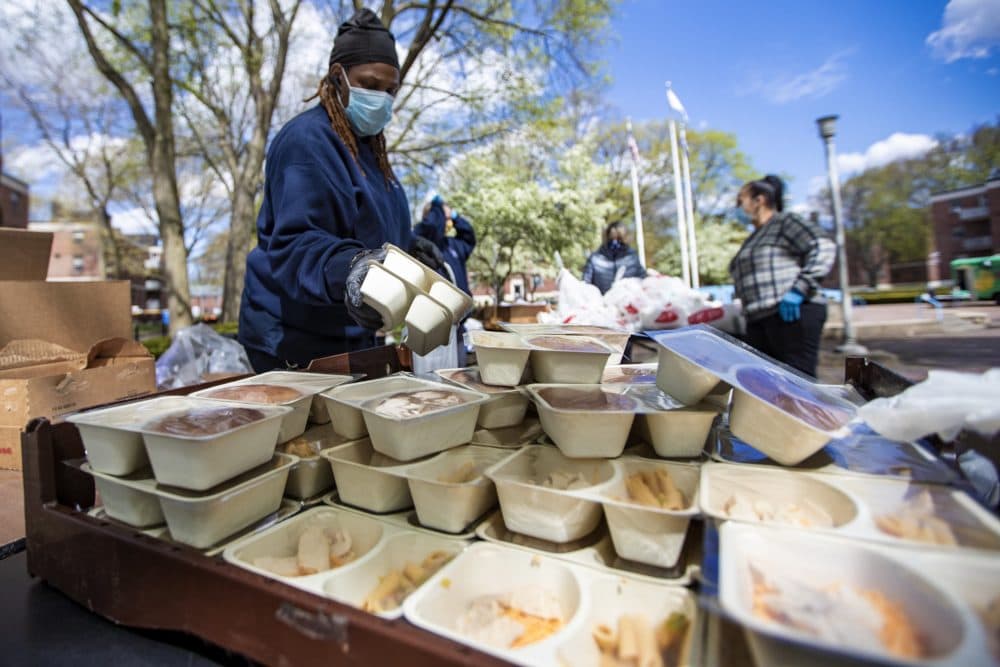
In Boston, feeding people in public housing — and those in need across the city — has taken on a life of its own in the era of COVID-19.
Since mid-March, several city agencies and nonprofits have worked together to distribute more than 1.1 million youth meals and about 70,000 adult meals at special sites set up around Boston, according to city leaders. The agencies and organizations partnering in the effort include Boston Public Schools, Boston Housing Authority, Boston Center for Youth and Families, The Greater Boston Food Bank, Project Bread and the YMCA.
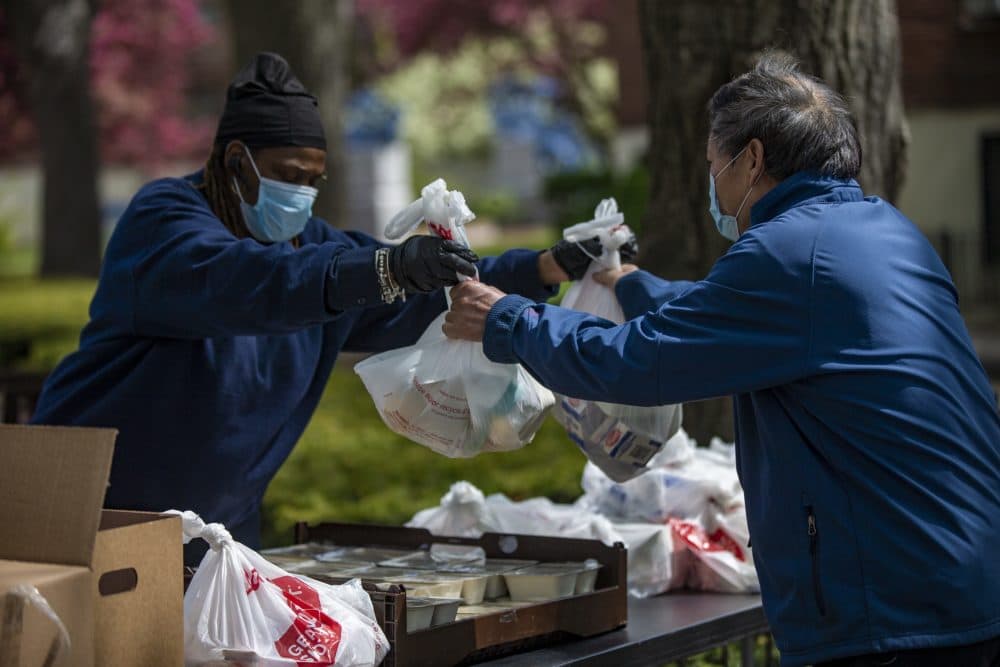
Urban planner Jonathan Greeley from Boston Planning and Development Agency is heading up the food distribution.
"This pandemic has hit so suddenly and with such an economic fury that I think one of the things we are really concerned with is that there are whole new groups that were not experiencing food insecurity that are now experiencing it," Greeley says. "Or there are groups that were on the line and have been pushed back into that food insecurity place."
On an early May day at BHA's Mary Ellen McCormack property in South Boston, masked and gloved housing authority employees hand out lunches of boxed turkey sandwiches, pasta salad and fruit for kids — chicken or vegan meals for adults.
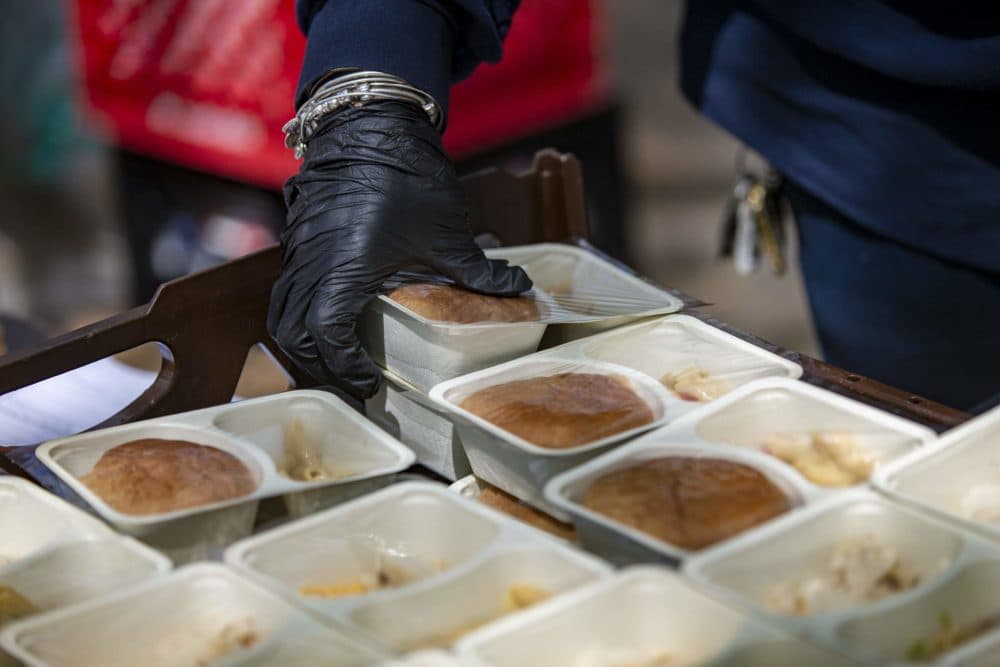
McCormack resident Meeka Green picks up a chicken entree, bottled water and fruit. She's an essential worker — a home health aide. But that doesn't bring a big paycheck. The food helps.
"I like it because at least it take us along the way," Green says. "You know, not really far, but it stops a gap."
The food is also helping Dimas Molina and his son stay afloat.
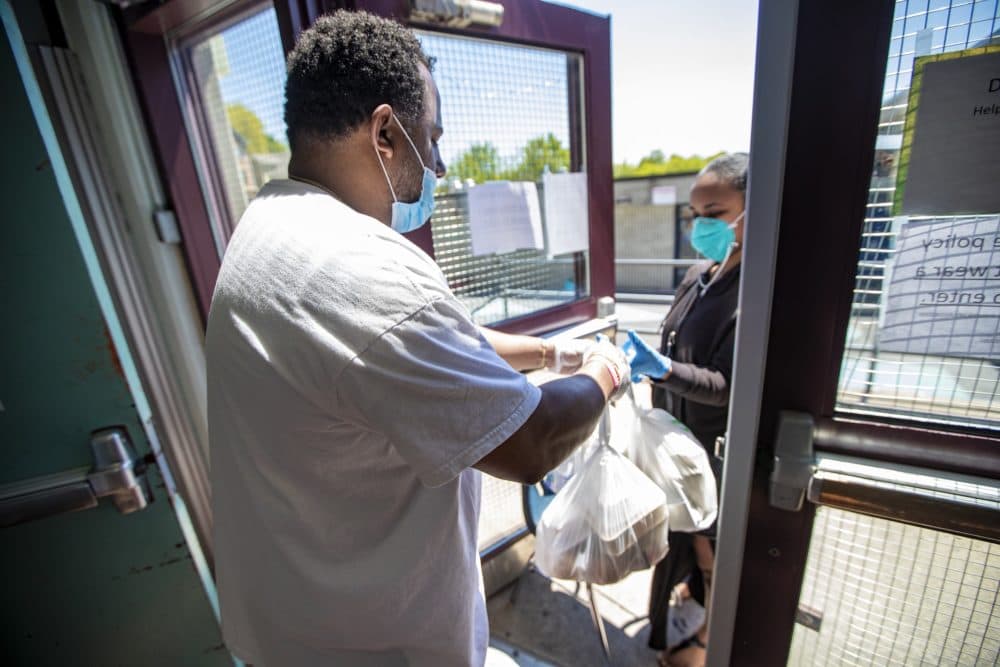
Meals are handed out at his BHA complex in Brighton. And, he says, employees from his son's public school in Roxbury even drive to his apartment to drop off food -- items including milk, rice, beans, meat and vegetables — along with toiletries.
"The food is good — it's really good," Molina says. "And that makes a big difference."
BHA Administrator Kate Bennett says in a matter of weeks Boston "figured out how to feed people in this city."
It's one part of a huge puzzle of trying to keep people from being hungry, but also, help them feel less anxious and more stable in their homes during this time of upheaval.
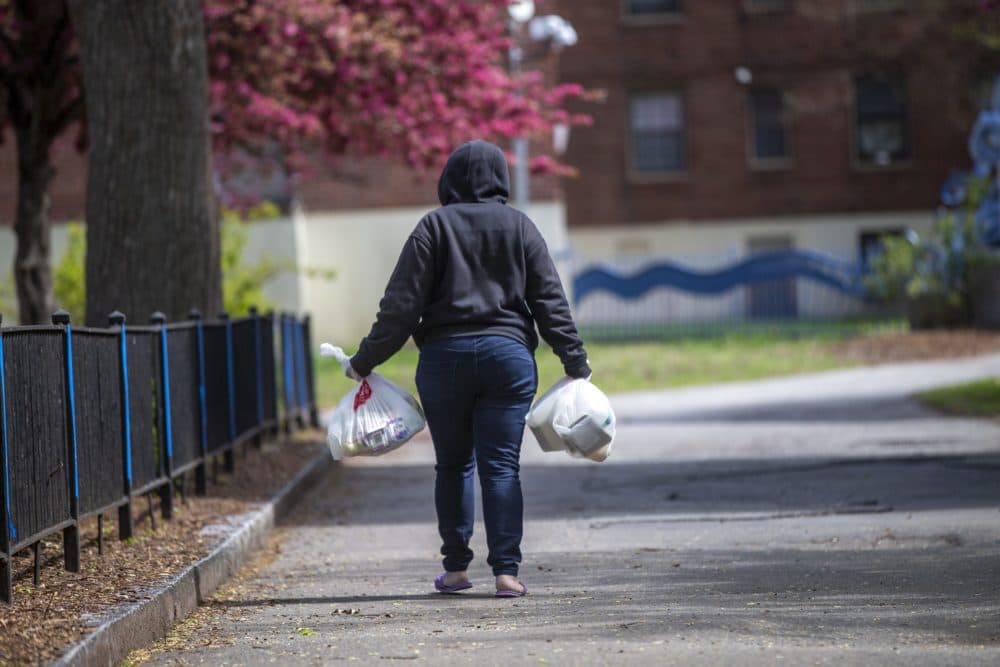
This article was originally published on May 22, 2020.
